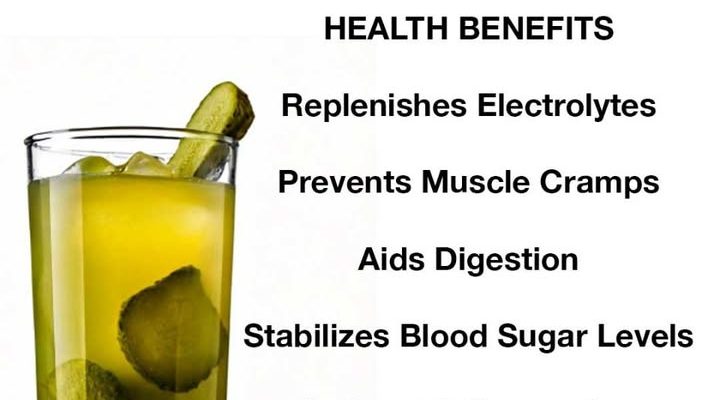Pickle juice, the tangy liquid that surrounds pickles in a jar, has been gaining popularity as a health tonic and sports drink alternative. While it might seem unconventional, many people swear by its benefits, ranging from muscle cramp relief to aiding digestion. The brine, typically made from water, vinegar, salt, and spices, is rich in electrolytes and antioxidants.
However, to truly harness its potential, it’s important to consume it correctly. This article will guide you through the common pitfalls and the right way to incorporate pickle juice into your routine.
Health Benefits of Drinking Pickle Juice
Replenishes Electrolytes and Prevents Muscle Cramps
Pickle juice is rich in essential electrolytes such as sodium, potassium, and magnesium, which help restore balance in the body after intense physical activity. These electrolytes prevent dehydration and reduce the risk of muscle cramps, making pickle juice a popular choice among athletes and fitness enthusiasts. The high sodium content helps the body retain fluids, which is particularly beneficial after strenuous workouts.
Aids Digestion and Stabilizes Blood Sugar Levels
The vinegar in pickle juice plays a crucial role in promoting digestion by stimulating the production of stomach acids and digestive enzymes. This can help break down food more efficiently and improve overall gut health. Additionally, vinegar has been shown to help regulate blood sugar levels by reducing post-meal blood sugar spikes, making it beneficial for individuals managing diabetes or insulin resistance.
Reduces Inflammation and Boosts the Immune System
Pickle juice contains antioxidants, such as vitamins C and E, that help combat oxidative stress and inflammation in the body. Chronic inflammation is linked to various health conditions, including arthritis, heart disease, and autoimmune disorders. By neutralizing harmful free radicals, antioxidants in pickle juice support the immune system, helping the body fight infections and stay healthy.
Supports Gut Health with Probiotics
Naturally fermented pickle juice contains probiotics, which are beneficial bacteria that support gut health. These probiotics promote a healthy balance of gut microbiota, improving digestion and potentially boosting mental health due to the gut-brain connection. A well-balanced gut microbiome is also associated with enhanced nutrient absorption and a stronger immune system.
Helps Maintain Hydration for Athletes
Due to its high sodium content, pickle juice aids in fluid retention, which is essential for athletes and individuals engaged in prolonged physical activity. Sodium plays a key role in maintaining the body’s water balance and preventing dehydration, especially in hot and humid conditions. Drinking pickle juice before or after exercise can help sustain endurance and performance levels.
Common Mistakes When Drinking Pickle Juice
One of the most common mistakes is overconsumption. Many assume that if a little is good, more must be better, but this can lead to excessive sodium intake. Another mistake is drinking it on an empty stomach, which can cause digestive discomfort due to its acidity. Additionally, some people consume pickle juice without considering their dietary restrictions, such as those with hypertension who should monitor their sodium intake closely. Lastly, not all pickle juices are created equal; some contain artificial preservatives and dyes that can negate the health benefits.
Optimal Amount and Timing for Drinking Pickle Juice
To maximize the benefits of pickle juice, moderation is key. A small amount, about 1 to 2 ounces, is sufficient for most people. It’s best consumed after a workout to help with recovery and rehydration. Drinking it before a meal can also aid digestion, but be cautious of the acidity if you have a sensitive stomach. For those using it to prevent cramps, sipping it before or during exercise can be effective. Always ensure you’re drinking a natural, preservative-free version for the best results.
Understanding the Risks of Drinking Too Much Pickle Juice
Excessive consumption of pickle juice can lead to high sodium levels, which may increase blood pressure and strain the kidneys. The acidity can also irritate the stomach lining, leading to discomfort or even ulcers in sensitive individuals. For those with existing health conditions like hypertension or kidney disease, it’s crucial to consult a healthcare provider before adding pickle juice to your diet. Additionally, the high vinegar content can erode tooth enamel over time, so it’s wise to rinse your mouth with water after drinking.
Conclusion: The Right Way to Enjoy Pickle Juice
Incorporating pickle juice into your diet can offer numerous health benefits when done correctly. By avoiding common mistakes and understanding the optimal amount and timing, you can enjoy its advantages without the drawbacks. Always choose natural, preservative-free pickle juice and be mindful of your overall sodium intake. With these guidelines, you can make pickle juice a beneficial part of your wellness routine, enhancing hydration, digestion, and recovery.



